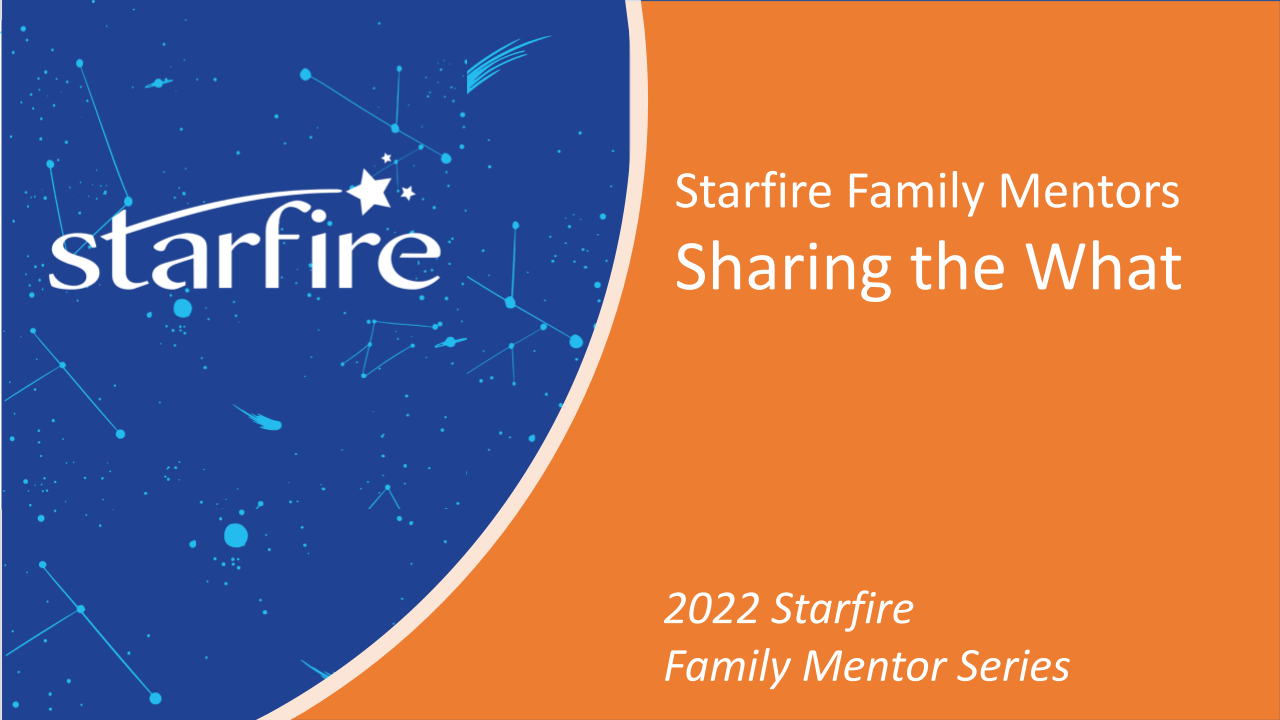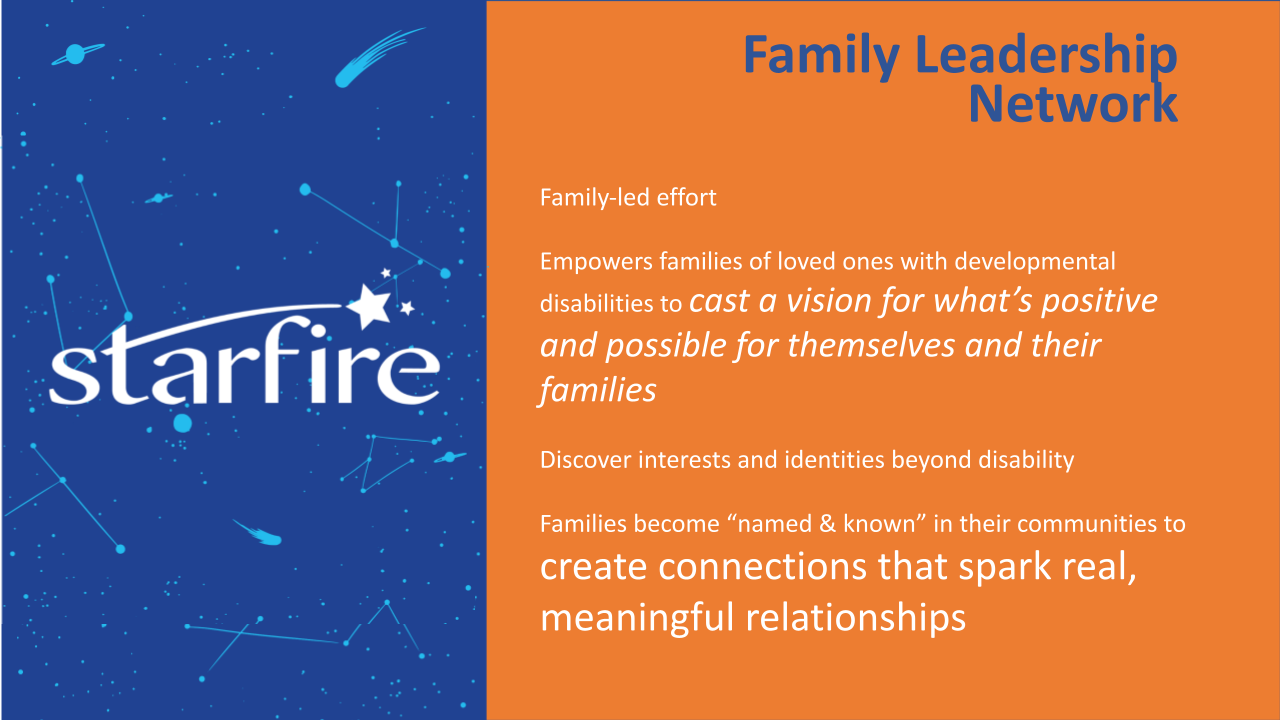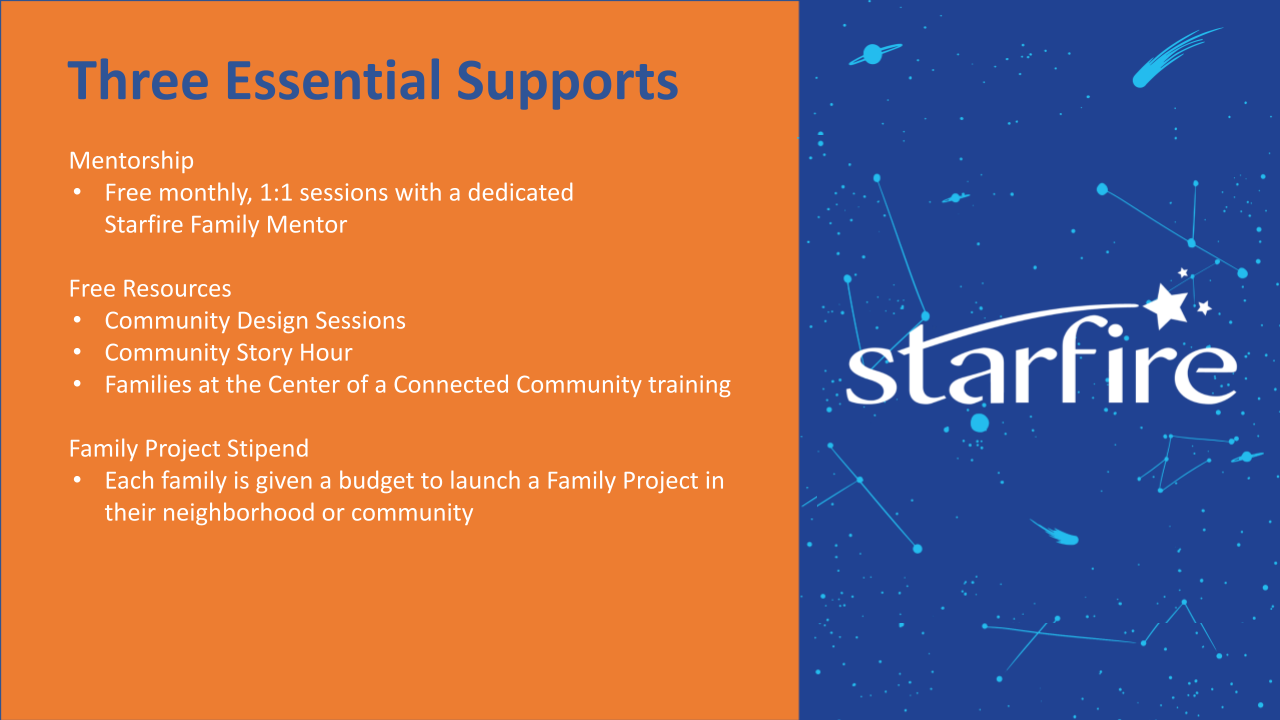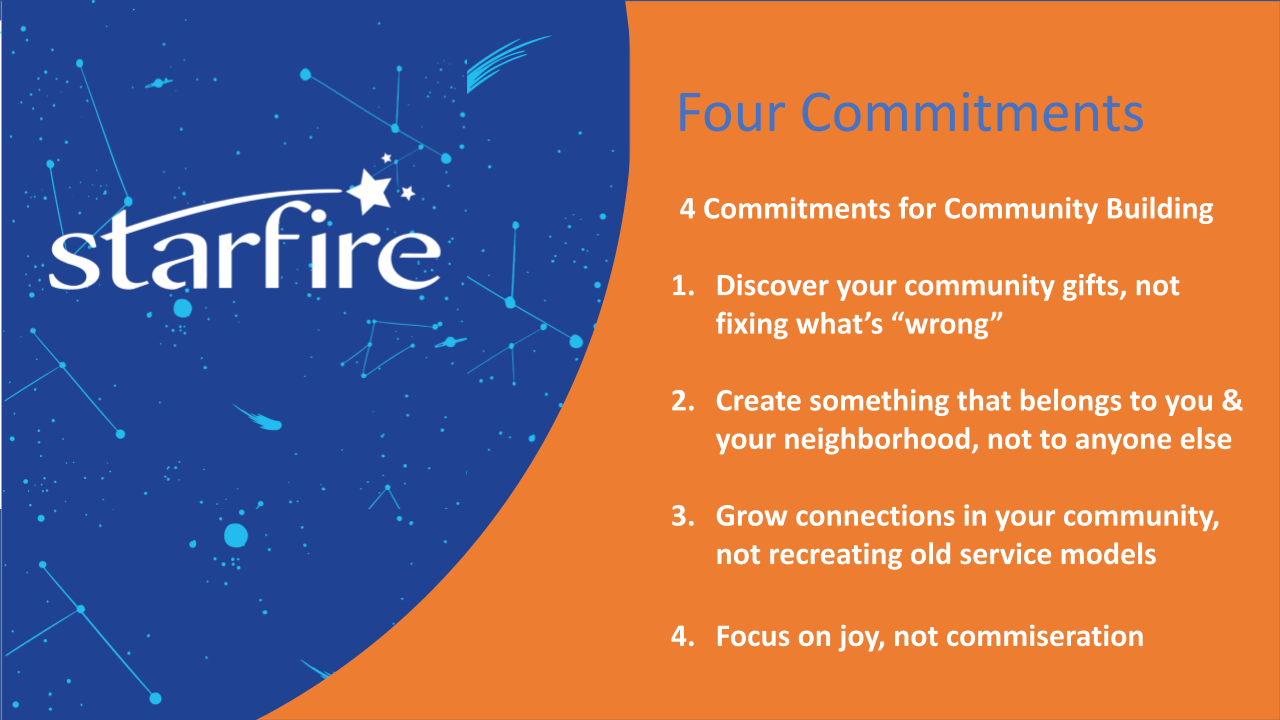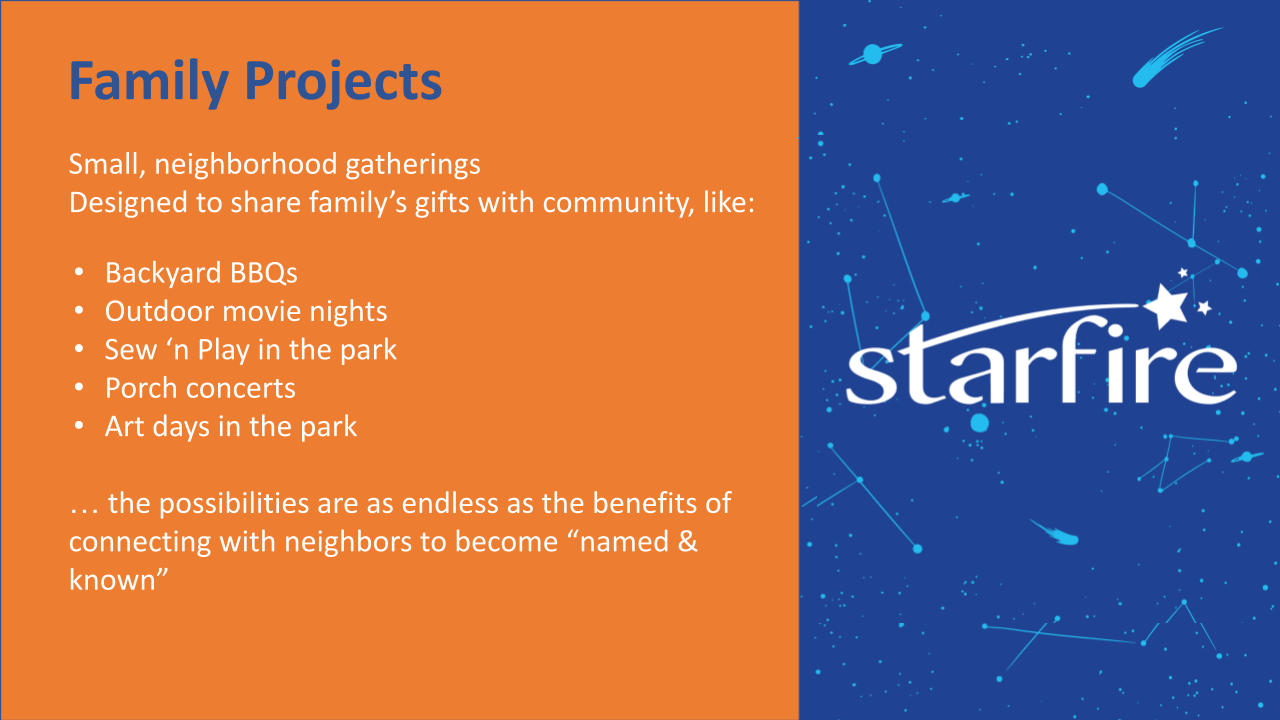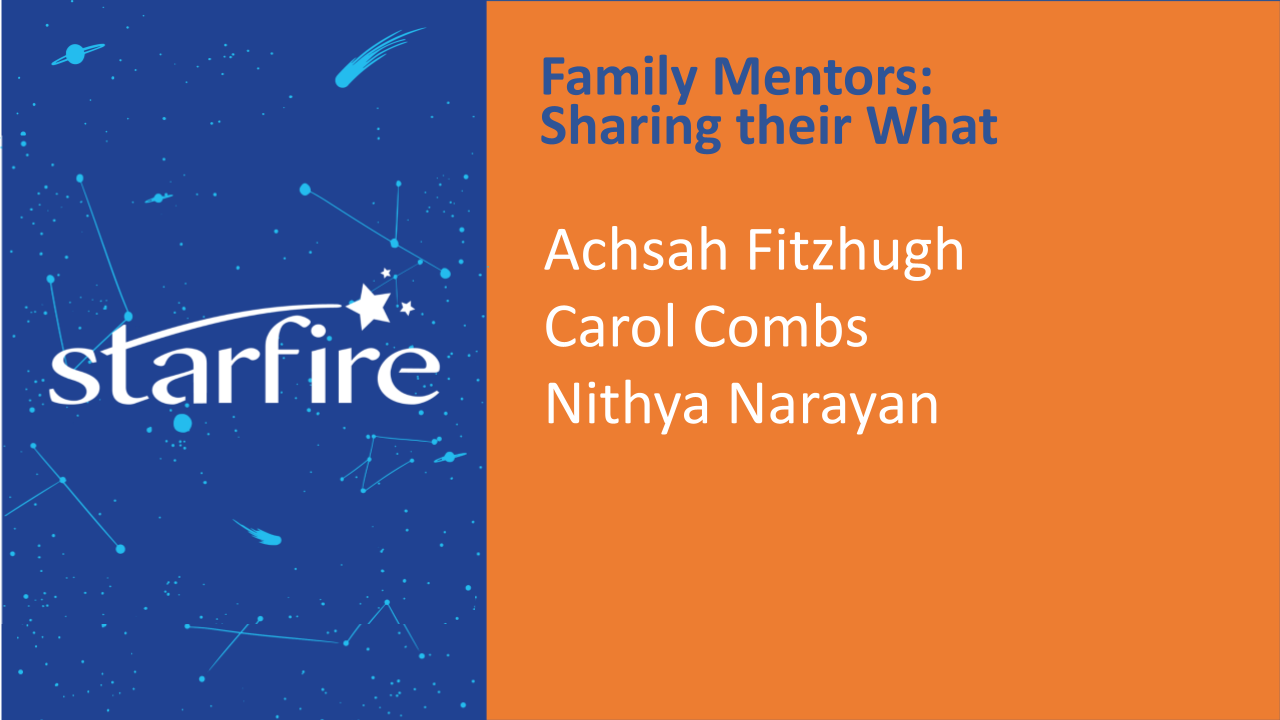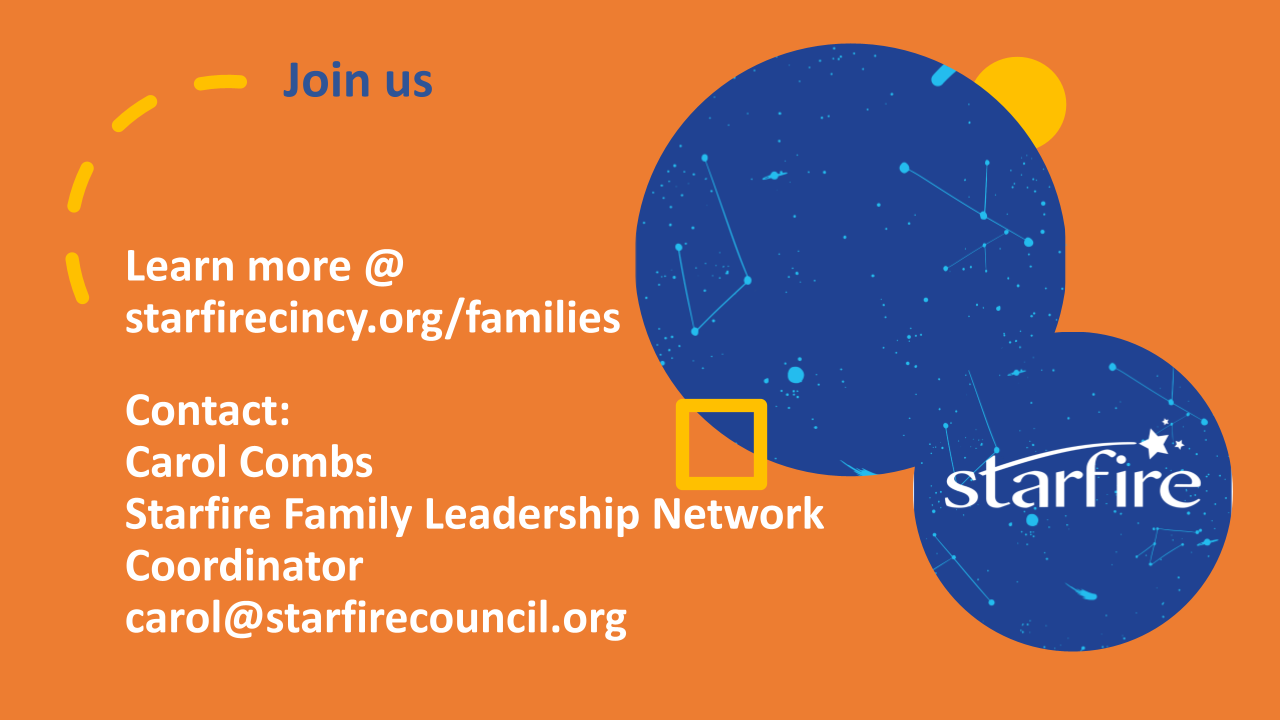Sharing The What | with Starfire Family Mentors
From Starfire, this is a podcast on what's more possible in inclusion, community building and relationships.
Robbie
Hello and welcome to Starfire's podcast, More. We're talking today with Achsah Fitzhugh, Nithya Narayan, and Tammi Stauber, three of Starfire's family mentors. As family mentors, they guide families of loved ones with intellectual and developmental disabilities to nurture relationships beyond common interests versus disabilities and beyond paid staff. As parents of loved ones with disabilities, Starfire family mentors have firsthand experience breaking the cycle of social isolation, creating sustainable community supports and developing better stories for themselves and their loved ones by creating and launching inclusive community projects.
This is the third episode on our Family Leadership Network. We've covered the who and the why, and you can find those on our website; and today we'll tackle the what.
Let's take a second to share some information about our program. The Family Leadership Network is a family-led effort that empowers families of loved ones with developmental disabilities to cast a vision for what's positive and possible for themselves and their families. It gives families an opportunity to discover interests and identities beyond disability. And one of the best parts is that families become, as we say, named and known in their communities and for something other than their disability, for something that they're interested in, for something that they do really well. And it gives families a chance to spark some connections and nurture those into real relationships, relationships that are based on common interests.
Families in the Family Leadership Network get three essential supports from Starfire. The biggest one is mentorship. So it's a free monthly one-on-one session with a dedicated Starfire family mentor, three of whom you'll meet today. And these mentors again, have firsthand experience as parents of someone with a developmental or intellectual disability, and they've launched their own family project. And they're going to share those stories today. More free resources that include a monthly community design session and a community story hour and a quarterly Families at the Center of a Connected Community training that offers a bit more in depth resources. And information about these can be found at starfirecincy.org.
Last but not least, families get a project stipend. We pay families to participate in this program with us for a couple of reasons. One, we really value their time and their dignity. And secondly, their investment of time is helping Starfire realize its mission, which is to build a more inclusive world alongside individuals with developmental and intellectual disabilities. So each family gets a budget. They work with a mentor to figure out what their program or project could be. They get money for that project, be it refreshments or signage or chairs or you name it. And then they launch the project and they get some pretty good results from a connection and from a relationship perspective. And we'll learn more about that in just a second.
Each family is asked to ascribe to for commitments and that's discovering their community gifts, not fixing what's wrong, creating something through that family project that belongs to them and their neighborhood and not anyone else, growing connections in their community and not recreating old service models. And the fourth commitment is focusing on joy and not commiseration.
The gentleman who leads our Starfire learning network is Tim Vogt and he just published a blog series on the four commitments. And that can also be found at starfirecincy.org and I invite you to take a read.
The family projects can be anything. They can really run the gamut from backyard barbecue to a sew and play in the park to chalk in the driveway to porch concerts, art days. And they're designed to share a family's gifts and the possibilities are endless, just as endless as the benefits of becoming named and known in their community.
If you want to learn more about this program after the podcast, I invite you to reach out to Carol Combs. Carol is the leader of the Family Leadership Network and her information is here. It's carol@starfirecouncil.org. and you can learn more about the program as well at starfirecincy.org/families.
So let's do some introductions. Achsah, Nithya, and Tammi are three of our nine, or 10 now, Family Mentors. And I want to thank the three of you for coming together today to share your what of participating in the Starfire family leadership network. Let's start with some introductions. Achsah?
Achsah Fitzhugh, Starfire Family Mentor
Yes. Thank you so much. My name is Achsah Fitzhugh. I live in Middletown, Ohio. I'm a mother of three children. My youngest son, Ahustin, was blessed with the disability of autism, and we are here just enjoying every piece of Starfire because it gives us the gifts we didn't know we had.
Robbie
That's awesome. Nithya?
Nithya Narayan, Starfire Family Mentor
Thank you for having me. My name is Nithya Narayan and I live in West Chester, Pennsylvania. I have two sons, 26 and 22 year old. My younger son, 22 year old, is Vineet and he has Down syndrome. We love hiking, cooking and foreign traveling. And we joined the Family Leadership Network to share our gifts with others and bring more people into our lives.
Robbie
Thank you. Tammi?
Tammi Stauber, Starfire Family Mentor
Hi, thanks Robbie. My husband Scott and I and our 23-year-old son, Kyle, live in West Chester, Ohio. So we laugh with Nithya. She's the Pennsylvania West Chester. We're the Ohio West Chester. Kyle is an awesome young man. He's an artist, he's a musician, but he also has the diagnosis of autism and has very limited speech. Our family is known for being the bird family. Kyle has memorized over 400 to 500 bird calls, and so we are the birders.
Robbie
Very good. I know that the three of you took some brave steps to participate in the Starfire Family Leadership Network and to launch a project. And I'm sure you had some concerns, whether they were, "Hey, do I really want to invite others into my family? I think we're doing okay." Or the concern may have been, "Hey, what if we do this thing and nobody shows up?"
Can you talk to us a little bit about how you pivoted away from those feelings or maybe share some other feelings that you had and how you kind of worked past or worked through those? Achsah?
Achsah Fitzhugh
Absolutely. Well, I had to find a way to trust my community. I had to make my community a safe place because I didn't want to enter judgment or put Ahustin or my family in a predicament that wouldn't be positive for our family. And I didn't want him to have judgment connected to his diagnosis or given a negative span because of a diagnosis. So I definitely had to find a way to find trust in my community and allow them to be everything that I wished and wanted them to be. And this was given to me as an opportunity to create that opportunity.
Robbie
So hosting the event, and I know you've had a couple of events, but hosting those first few, that helped you find the trust, that helped you build the trust?
Achsah Fitzhugh
Absolutely. It actually created the conversation. The trust was there, but the conversation grew from that. So now the conversation is not about a disability or a diagnosis. It's about the excitement that we bring to our community.
Robbie:
I get that. I hear that. Nithya, what was your experience?
Nithya Narayan
The biggest benefit in doing a project were we had mentors to go back to, to talk to. Our mentors really helped us through these feelings by sharing their experiences and wisdom. And that was very, very helpful support. And also, I think since I am in Pennsylvania, I was able to listen to those story hours every month, and it was so relatable. Every families who did a project did share that their fears, that what if people don't show up. So it was very relatable. It was helpful to be on those story hours and to have those monthly talk with our mentors, to understand that these are common experiences. That helped me to acknowledge these feelings, to accept these feelings, and focus on how we can bring people together on the project.
Robbie
Yeah. That's half the battle, isn't it? Just acknowledging that there's a concern rather than blowing by it, rather than working around it, rather than not addressing it and then having it come up later when you might not be in the right space to tackle it. And maybe frankly, that's what keeps some folks distant. I'm really glad you mentioned the story hours. That's something that Carol hosts every month on Zoom and those offer some great ideas about the types of projects and the questions that people are concerned with on the front end, so thank you for that.
Tammi, what about you? What were your concerns and how did you kind of work past them?
Tammi Stauber
We definitely had our hesitations and fears. We consider ourselves very shy people. And our first fears, of course, were would people come, as you mentioned, Robbie, and what project could we do that would encourage people to come. Would it be more rejection? So our mentor encouraged us to break it down into a small part. Just take someone friendly to coffee. And we thought, "Well, we can do that."
Someone who shared a passion or interest, and boy, those 400 to 500 bird calls that Kyle knew, that was what boiled to the top right away. There are lots of bird enthusiasts in Cincinnati. So we took one friendly birder that we knew took coffee, and he was so excited. So many ideas and magic bloomed out of that one conversation. When you talk to other people about their gifts, it's just the magic just grows. So for us, it was picking a passion and just taking one person.
Robbie
Yeah, It starts with one. Something Carol Combs, who again, leads the Family Leadership Network, something she said at the last podcast was that the answer's always going to be no unless you ask the question, do you want to participate? And that to me is akin to how the magic grows. When you find that one person who shares that interest.
So during your project, Achsah, what was the one key or surprising thing you learned about yourself and about your family during your first project and your community? What can you tell us about that?
Achsah Fitzhugh
Well, I was surprised by the fact that Ahustin was a leader in the project. He just got in and just did everything he wanted to do without any type of redirection or any help needed, which my mind, I always thought Ahustin would always need help from me. But guess what? Ahustin showed me that he did not need me to lead. And because of the project, Ahustin is the ultimate leader in our community. People actually go to Ahustin and ask Ahustin, "What's next? What are we going to do next week? What are we doing next month? What are we doing? Versus asking me anything, they go to Ahustin. He's not being directed. He is the direction in our community.
Robbie
That's awesome. A couple of sessions ago, Carol Combs shared that after her family projects, before they had done a project, when Carol would have to call for EMT support, the medical professional would just deal directly with Carol and not with Grayson. And then after those projects, Grayson became a person to them. And then the conversation shifted. Right? The narrative shifted. It was a word shift. It wasn't, "Mom what's going on?” Instead it was, "Hey, Grayson. Yeah. I've seen all those cool things you're doing over at Jefferson Park. How can we help you today?" And it was uplifting. And Carol probably didn't think that anyone would address Grayson in that manner. And just like you with Ahustin, it must have been super empowering to have someone say, 'Hey Ahustin, what's the next plan?" And for you not to have to jump in. So that's great. Thank you so much for sharing.
Tammi, what was a surprise that you experienced or maybe a takeaway?
Tammi Stauber
I have two. One, I can take someone to coffee. I can actually do that. Number two, I can start to have people come into Kyle's life, real friends, who are not paid to be there, who share interest with him, who will surround him and care about him when I'm gone. And that's probably the most powerful thing that has happened during this whole Starfire adventure. The community, what I learned is that they're friendly. There are friendly people out there, not everyone, but there can be friendly people. And Kyle's known as a birder now in Cincinnati and people know him when we go on hikes. So he's named and known for not autism, but for just being a birder.
Robbie
That's huge. Nithya, what about you?
Nithya Narayan
I think for us as a family and for Vineet, [it was seeing that] his greatest gift is bringing people together. And we could do that around hip hop. That was something that I discovered that I could do that. I am from India, and have no clue, anything, nothing about hip hop! So to bring people together around whatever his gifts are, whether it's cooking, whether it's dancing. He loves hip hop dancing. So to bring people around his gifts, whatever it may be, it can be done through the support of people in the community. We didn't know anything about hip hop, but then we reached out to the people where he was learning. So we could do that through the connections with others. So I think that was a big learning for me.
We did a couple of projects. And the other thing that I noticed was one of the community members who came to our event, told us, "Oh, I'm here to make connections."
And I'm like, "Isn't that why I'm doing this?" So there are others, champions in the community, who want this too. It's just not from our end. There are people who support this. So that was a great discovery for me by doing this project.
Robbie
’I'm here to make connections.’ That's it. That's the mission of the organization, and I love the fact that you heard that. That's fantastic.
We have just a couple more minutes, maybe share with the group, the effect that Starfire has had on your ability to build relationships with neighbors or caregivers or the disability system. Have you noticed a difference since when you began with the program to now? Asha, you want to take that one?
Achsah Fitzhugh
Sure. I would say that I definitely am thankful for the opportunity to even have the project, because right now, because of that one door, we now have a movement in our neighborhood called “Operation Hello Neighbor”, that Ahustin named because of that very first [Starfire family project] event. And now we're known as Operation Hello Neighbor. And we would have never been able to change our narrative of being the family with a disabled child if we did not have that opportunity. We would have been always seen as the broken family on the street, but we're not. We're now the family of Operation Hello Neighbor and we're addressed as such, which is major to be seen with a title. We definitely gained power in our movement, in our community project. So I'm thankful and I'm walking around with power because of the opportunity.
Robbie
That's awesome. I'm so glad to hear that. Nithya, what about you?
Nithya Narayan
Couldn't agree more, Achsah. I think I have just become brave enough to ask people around me, around my neighborhood, around my community to share our gifts to bring people together. So I think that definitely has helped me become more braver. And I think the cost that we were paying was isolation and loneliness for Vineet. So definitely I am not concerned about that anymore because there are so many freely giving relationships and connections in the community. We just have to keep asking people around us to come together and to share their gifts.
My concern was, how am I going to do it living in West Chester, Pennsylvania. Right? Starfire is in Cincinnati. So I think I was able to be online, attend virtually a lot of things, learn a lot of things. So I think it was a big segue into learning more about how to bring more people, not only into my son's lives, but for us, ourselves as a family, so that we are not isolated because of disability.
Robbie
Yeah. I really like what you said about, "Hey, I'm in Pennsylvania. You guys are in Cincinnati. How is this going to help me?"
And I think the only good thing from the pandemic, other than the vaccine, of course, the best thing was the connectivity that we all found with Zoom. So I'm really glad to hear that you were able to take some of those learnings from this Cincinnati based organization. And over the last couple of years, we've seen a huge demand for these services, for these community building and family network services. Not just in Cincinnati or the tri-state region of Ohio, Kentucky, and Indiana, it's growing. The movement's growing. And that's very exciting.
Tammi, what about you? Was there an aha or a huge takeaway other than the fact that it started with one? You found one person for coffee who could talk about birds and that led to a whole host of connections for Kyle. Anything else?
Tammi Stauber
For us, we tended to focus on passions as we moved forward, because that worked for us with the birding community. Kyle's an artist, so we're reaching out to the art community. My husband likes rocks, geology. So we took Kyle to a geology group and Kyle didn't like it. And that's okay. We've learned. We're building some muscle to reach out to all kinds of passions in our family and see what genuine connections. Maybe it leads to a relationship, maybe not. Maybe it leads to a friendship, maybe not. But we're getting to be known out in all of those different areas that Kyle likes and Scott likes and I like as just people who enjoy those passions instead of the family with autism. And like Asha said, we're building a new identity for Kyle. And as Nithya said, we're leaving that isolation and rejection behind.
Robbie
Well said. And thank you. Thank you all so much. If you, or a neighbor or a friend or a work colleague has a loved one with a developmental disability and you want to know more about our program, reach out. If you are an ordinary citizen and you want to learn more about our program, reach out. If you just want to support our work, that's fine too. We're going to be 30 next year, believe it or not. So we're going to plan a whole host of fun things to commemorate our 30 years of service. You want to engage with any of that, we'd love to have you. So thank you very much.

